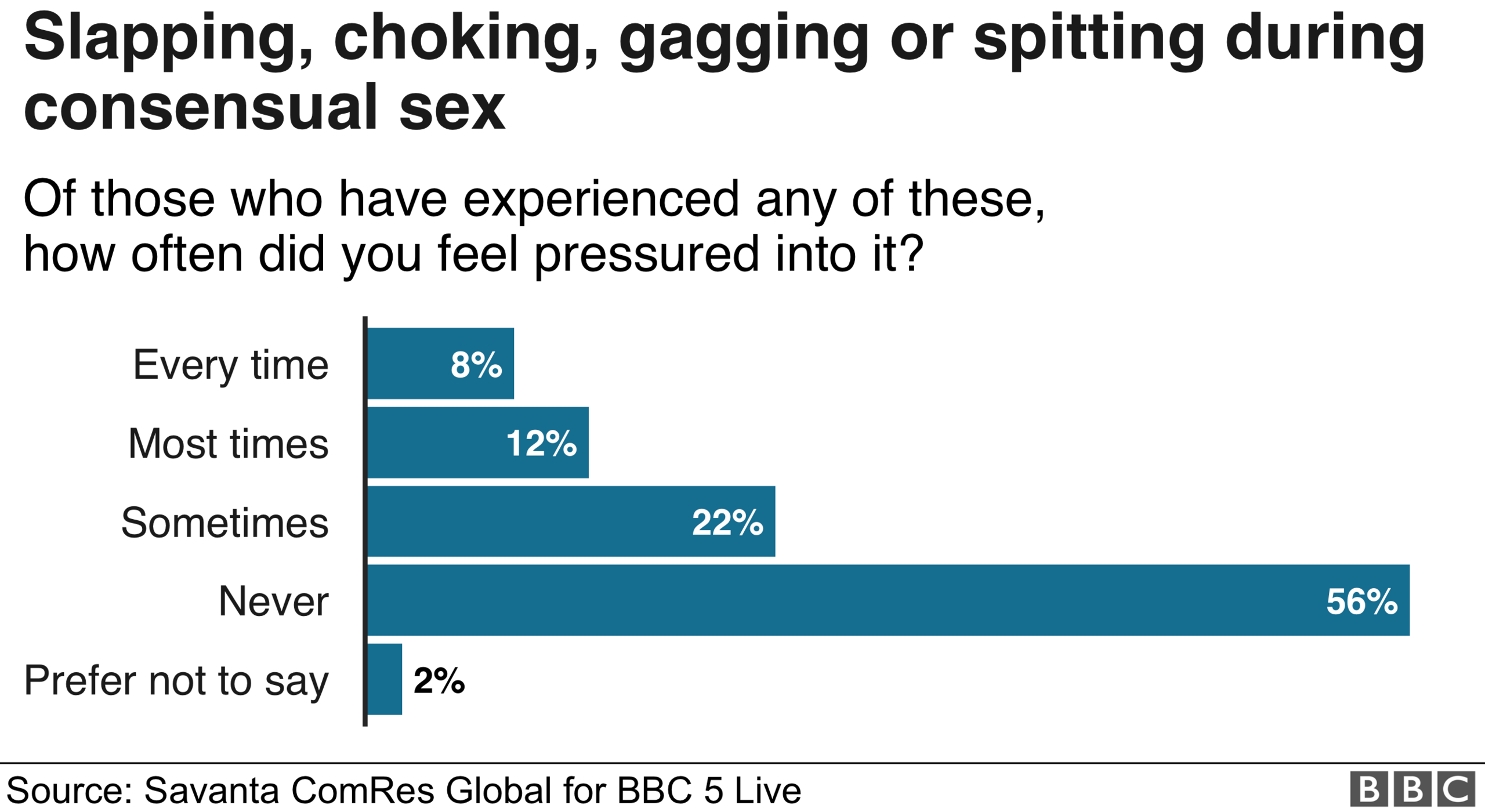Rough sex murder defence: Why campaigners want it banned
- Published

Fifty Shades of Grey has been credited with helping BDSM into the mainstream
Campaigners say men are increasingly using the "rough sex" defence to try to get away with murdering women. They want the law changed to prevent such a defence and have the support of two MPs. But what difference would it make?
The death of British backpacker Grace Millane provoked an outpouring of anger and disgust, not only because of the circumstances in which she lost her life, but because of how her killer tried to explain away her death.
He told police that Ms Millane had asked to be strangled during sex, and her death was an accident. Personal details about the 22-year-old's sex life and apparent interest in BDSM were then discussed in court, and duly reported on by the world's media. Commentators believed she was being "slut-shamed" and blamed for her own death.
Ms Millane, from Wickford in Essex, was murdered in New Zealand, but back home in England former solicitor general Harriet Harman wants the law changed to stop men from being able to use the defence of "rough sex gone wrong" - even if the death is a genuine accident. They should always be prosecuted for murder, the Labour MP believes, and it is "his bad luck" if a man accidentally kills his partner during sex.
"The new version of men being able to blame the woman they killed for her own death is by saying 'she wanted the violence'," Ms Harman told Woman's Hour. "And the difficulty is that there were two people there and only one of them gets to speak because he has killed her, and therefore her version of events is not heard."
This defence offered by Ms Millane's killer was rejected, and he was convicted of her murder. But, still, the case has led to increased concerns about men using the so-called "Fifty Shades of Grey" defence in murder trials.
How common is 'rough sex'?

Figures show a growing pressure on young women to consent to violent acts, campaigners say
It's very common, a survey published in November suggests.
Commissioned by BBC Radio 5 live, it asked 2,002 UK women aged between 18 and 39 if they had experienced various acts during sex.
The majority (59%) had experienced slapping, 38% had experienced choking, 34% had experienced gagging, 20% had experienced spitting and 59% had experienced biting. Almost half of the women (44%), said these acts were always wanted.
However, 29% said they were unwanted some of the time, 14% said they were unwanted most of the time, and 10% said they were unwanted every time.

The Centre for Women's Justice said the figures showed a "growing pressure on young women to consent to violent, dangerous and demeaning acts", which was "likely to be due to the normalisation of extreme pornography".
But one 28-year-old woman, who spoke to the BBC anonymously, said the feeling of domination that came with choking was "a pretty common sexual fantasy".
"Sometimes, during sex, my partner will put his hands around my throat, or hold me down by my throat," she said. "It is never so hard that I cannot breathe at all.
"Whether you know each other well or not, when a person asks a sexual partner to be rough or to choke them, they are asking them to take on responsibility for their safety.
"If you have any doubts about your ability to keep them safe, you say no. Once you've agreed, there's a line between consensual rough sex and dangerous abuse and you need to be able to communicate where that is throughout, verbally or non-verbally.
"A person who asks for rough sex does not intend to die so when they do it is down to, at the very least, the negligence of the other person.
"If you are trying not to kill someone, you won't kill them. It is only through failing to try not to, or actually trying to kill them that you will."
So how dangerous is strangulation play?

Charlotte Teeling was murdered when Richard Bailey strangled her during sex
It's potentially deadly, according to pathologist Dr Stuart Hamilton - although he points out the risks should be obvious.
Strangling is "inherently dangerous" because compression of the blood vessels causes a lack of blood flow to the brain, he said. "With pressure on the neck, normally you become unconscious quite quickly.
"It's not for me to pass a view on what people do in the privacy of their own homes - personally I wouldn't fancy it - but be very well aware that it is a dangerous thing to do.
"So if you are in your right mind and your partner stops breathing, a jury could reasonably infer that the logical thing to do would be to stop strangling them and say, 'Are you all right, pet?' rather than maintaining pressure on an unresponsive human being for another few minutes," he said.
In terms of establishing whether there was intent to cause serious harm, he said cases like this could be challenging.
Dr Hamilton, who examined the body of Charlotte Teeling after she was strangled by Richard Bailey during sex, said it was difficult to tell through forensic examination whether or not there was an intention to kill.
"As a pathologist, the physical findings are that somebody has been strangled to death," he said. "If you strangle someone deliberately in order to kill them or if you've seen something on the internet and decide to give it a go and it goes horribly wrong, the physical findings aren't going to be all that different.
"We don't know what the deliberations are in the jury room, but I think the fact he [Richard Bailey] had left the body in his flat for a week and used her [Charlotte Teeling's] bank card after she died probably swayed the jury's mind."
Why do campaigners think the law should be changed?

John Broadhurst was originally charged with murdering Natalie Connolly, but the prosecution later accepted his plea to gross negligence manslaughter
The group We Can't Consent To This has collated 59 examples of women "killed by men who claim a sex game, gone wrong" and, along with Ms Harman, is demanding that the rough sex defence should be outlawed. The group's numerous supporters include the Guardian, external newspaper and women's magazine Grazia, external.
When Grazia asked Prime Minister Boris Johnson about the proposal, he said: "I agree with Harriet Harman that the '50 Shades defence' is unacceptable and we'll make sure the law is clear on this."
The campaign also has the support of Mark Garnier, the Conservative MP for Wyre Forest, who started looking at the issue because of the Natalie Connolly case.
Ms Connolly - whose parents live in the MP's constituency - was left to die by her boyfriend John Broadhurst after what he said had been consensual sex.
She was left bleeding and suffered more than 40 injuries. Broadhurst was sentenced to less than four years in prison for her manslaughter.
How might the law be altered?

Natalie Connolly's partner admitted gross negligence manslaughter for leaving her unsupervised at the foot of the stairs without calling emergency services
What campaigners want is to amend the Domestic Abuse Bill currently going through Parliament, to make it the expectation that murder charges are brought against those suspected of killing a person during sex.
As it stands, if someone kills another person during sexual activity they could be charged with manslaughter alone. To murder someone, there needs to have been an intention to kill that person or to cause them grievous bodily harm (GBH).
"If the prosecuting barrister wants to reduce the [murder] charge because they feel they are more convinced they will get a conviction [of manslaughter], that would have to be agreed by the director of public prosecutions," said Mr Garnier. He believes this could have made a difference in the prosecution of John Broadhurst.
"We were worried that the prosecuting barrister didn't show a significant amount of nerve or braveness in terms of prosecuting the full case of murder," he said. "We want to make sure that administrative change within the law is done so that this can't happen again, so that someone like Natalie's killer is not let off with a lesser charge."
A second amendment backed by campaigners is to do with people consenting to being injured.
In the late 1980s, in a case known as R v Brown, the UK's highest court ruled that consent was not a defence to actual bodily harm (ABH). The judgement concluded a case in which a group of men had willingly submitted to whippings and beatings, for sexual satisfaction. Evidence had only come to light because the men had videotaped the acts.
What Ms Harman wants is for this to be written into the bill going through Parliament.
"R v Brown is in case law but bearing in mind we've got a new Domestic Abuse Bill, it would be right to put it in statute law," she said. "Statute law is much more under the noses of the judiciary and the prosecutors and the defence."
But barristers are cautious.
"Kneejerk" legislation that is a response to prominent campaigning, risks "creating bad, unworkable" laws that fail to protect the public, said Caroline Goodwin QC, chairwoman of the Criminal Bar Association.
So does the law really need to change?

Ashley Foster claimed he accidentally killed Megan Bills by strangling her during sex - but a jury at Wolverhampton Crown Court did not believe him and convicted him of murder
Dr Samantha Pegg, who lectures at Nottingham Law School on criminal law regarding sadomasochism (S&M), thinks not.
She believes what is being proposed would change nothing in practice, but merely "clarify" the existing law.
"At the moment it's no defence at all to say that person is consenting, because of Brown. People certainly can't consent to being killed, they can't consent to injury which amounts to actual bodily harm if it's in the course of S&M."
Dr Pegg said the changes would not prevent defendants from claiming they killed someone accidentally through rough sex.
"It won't stop people making these claims," she said. "It does seem over the last year or so that there has been absolutely a significant shift and people do seem to be using that excuse of sadomasochism. It might just be that shift in culture and they think a jury might believe them, or in fact it might be true. But we can't stop them doing that."
Rosina Cottage QC, a barrister at Red Lion Chambers, agrees. "The changes will not affect the ability of a defendant to run a defence of lack of intent to murder and nor will they assist those campaigning for the protection of people from sexual violence," she said.
And in any case, Dr Pegg said defendants were not necessarily getting away with murder by using this defence. "It's not an excuse that a jury is necessarily going to buy into," she said.
"They [jurors] are going to have to look at the facts and decide whether there is some truth in this matter or whether they [the accused] are just trying to buy into social constructions of people engaging in these kinds of activities."
What if someone does die in a genuine accident?

Harriet Harman believes a man should be prosecuted for murder even if he did not intend to kill his partner
Ms Harman believes a man should always be prosecuted for murder even if his sexual partner consented to the violence, and even if the man did not intend to kill her or cause her GBH.
"I mean if he's squeezing her neck and saying 'but actually she was saying more, more' well it's murder, because he's intending to squeeze her neck and that's the actions which caused her death," the MP said.
But what if the man did not intend to harm the woman by strangling her? "Well that's his bad luck," she said. "He is intending to put his hands on her windpipe."
However, barristers who spoke to the BBC have concerns about this.
Abimbola Johnson, of 25 Bedford Row, said: "The law makes the distinction [between murder and manslaughter] because murder charges are, rightly, reserved for instances when someone deliberately and intentionally causes someone at least serious harm which results in their death."
Rosina Cottage QC said: "To deprive an individual of the defence to murder is an extreme measure and should only be undertaken after a wide-ranging and considered discussion about the ramifications."
Obscenity lawyer Myles Jackman believes removing the right to such a defence would be "a horrendous intrusion into human rights and freedoms".
"I'm really concerned that there is a risk that people may die through consensual rough sex, and the person responsible did not intend for that person to die - it was just a dreadful accident that ruined people's lives - and they should not be punished in the same way as someone who deliberately preys on victims that they find on Tinder," he said.

Grace Millane's killer claimed he accidentally killed her during sex - a story rejected by jurors
Author and journalist Rebecca Reid, who has written about her experiences with BDSM, external, believes that while the "sex game gone wrong" claim can be a "hastily pieced-together excuse when a woman has been murdered", rough sex between consenting couples can be a real risk.
In an age when BDSM practices are more mainstream, she argues that some people need better education about how to stay safe.
But rough sex did not kill Ms Millane, she stressed.
"The difficulty is that it feels like people who have nothing to do with BDSM are appropriating it to try and get away with some vicious and evil behaviour, which is really sad for a community that has spent a long, long time fighting for some recognition and a right to exist in an authentic way," she said.
"The important thing with the Grace Millane case is that it was not that he was a well-intentioned young man trying to please his new fling who accidentally got it wrong. This isn't a case of people emulating what they've seen in porn and making honest mistakes.
"This was calculated murder."
If you have been affected by sexual abuse or violence, help and support is available at BBC Action Line.
- Published5 December 2019

- Published28 November 2019

- Published22 November 2019

- Published22 November 2019

- Published22 December 2018
